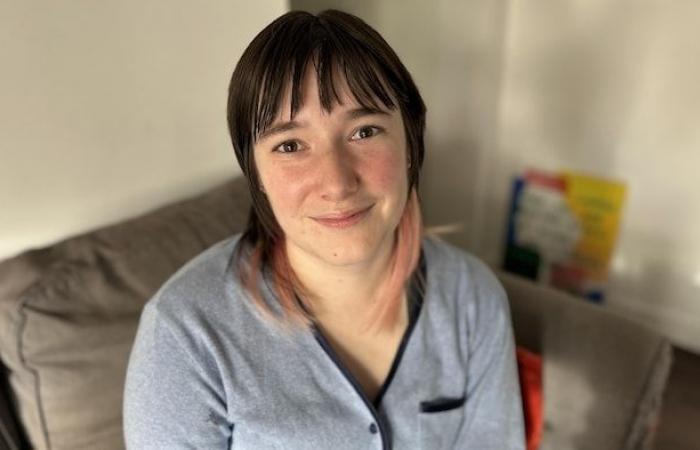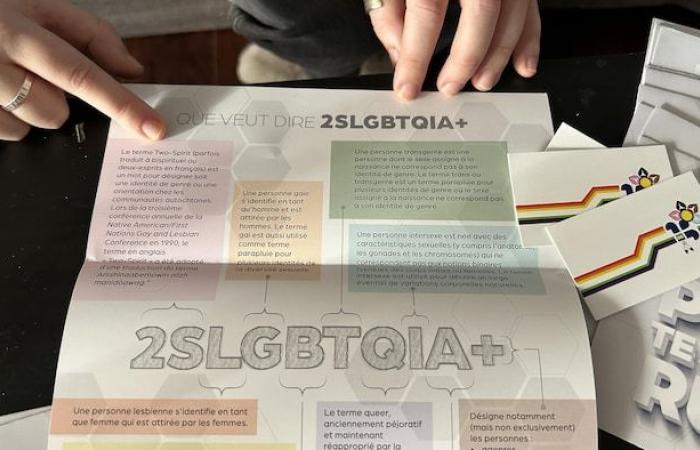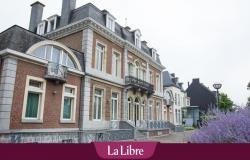The year 2024 will not have been the easiest for trans people in Canada. Some feel like they have become political pawns used in increasingly polarized debates. This is what encourages the FrancoQueer de l’Ouest committee to redouble its efforts in terms of education.
A workshop on violence based on gender identity, organized by the French-speaking community center La Boussole in Vancouver with the committee, focused in particular on the question of good allies. The workshop in question was led in part by Amélia Simard, a transgender person who uses the pronoun iel (a neutral pronoun) and feminine agreements.
Amélia is a community development agent for British Columbia for the Comité FrancoQueer de l’Ouest and a project manager for the TransÉquité project.
Open in full screen mode
For Amélia Simard, it is important to use science to educate people about gender identity issues.
Photo : - / Julie Landry
Amélia considers herself lucky to live in British Columbia, where she perceives an openness of the population towards her community, but she admits that this situation is fragile. This year, the big fear for me, and then my community, was really the elections in British Columbia.
says the development agent.
Amélia is particularly concerned about certain comments made by Conservative Leader John Rustad, which are similar, according to her observations, to those of Alberta Premier Danielle Smith, whose government has banned access to people under of 16 years to hormonal therapies and access for minors to gender assignment surgical operations.
My community is being used as an electoral pawn
deplores Amélia, who sees it as a form of regression in society.
With the rise of hatred, with the rise of violence – especially in terms of electoral projects, like those of John Rustad or those of his candidates, or those that we see in Alberta especially – it is very scary for the vision to long term of the general population towards trans people
fears Amélia.
It’s really scary to be dehumanized in such a way.
Amélia also attempts to undo regional myths. We tend to think that in B.C. […] everything is fine, but basically we have to sound the same alarm. We are not immune to this wave of hatred, unfortunately
according to his findings.
The importance of education
These fears are one more reason for the FrancoQueer de l’Ouest committee to give workshops in schools and with French-speaking organizations. Because we know that everything goes through education, recalls Amélia. Younger children are used to the idea that there are people who are going to be different […] in their surroundings, the least, statistically, we see violence.
Open in full screen mode
According to Amélia Simard, education is the key to reducing violence against the trans community.
Photo : - / Julie Landry
People who want to be good allies can start by learning about trans identity and then making an effort to use the right pronoun, for example. Even if you make mistakes, it’s super important to continue to make an effort, and then do your best to correct yourself, because that really shows a lot of love
explains the development agent.
Taking the time to talk to queer people, or even finding older trans people who could become mentors for your child, can also be a good idea.
Another way to be an ally is to help answer questions and explain transidentity and pronoun choices to those around you. Amélia adds that her community is lucky to be in British Columbia because there are a lot of information resources there. Those in French are, however, more limited.
The important thing for Amélia is that good information based on science circulates. This is why the FrancoQueer de l’Ouest committee does the work […] education, because it’s super important to get everyone back on the same page, especially in the French-speaking world [où] it creates a safe space for all people within this community.







